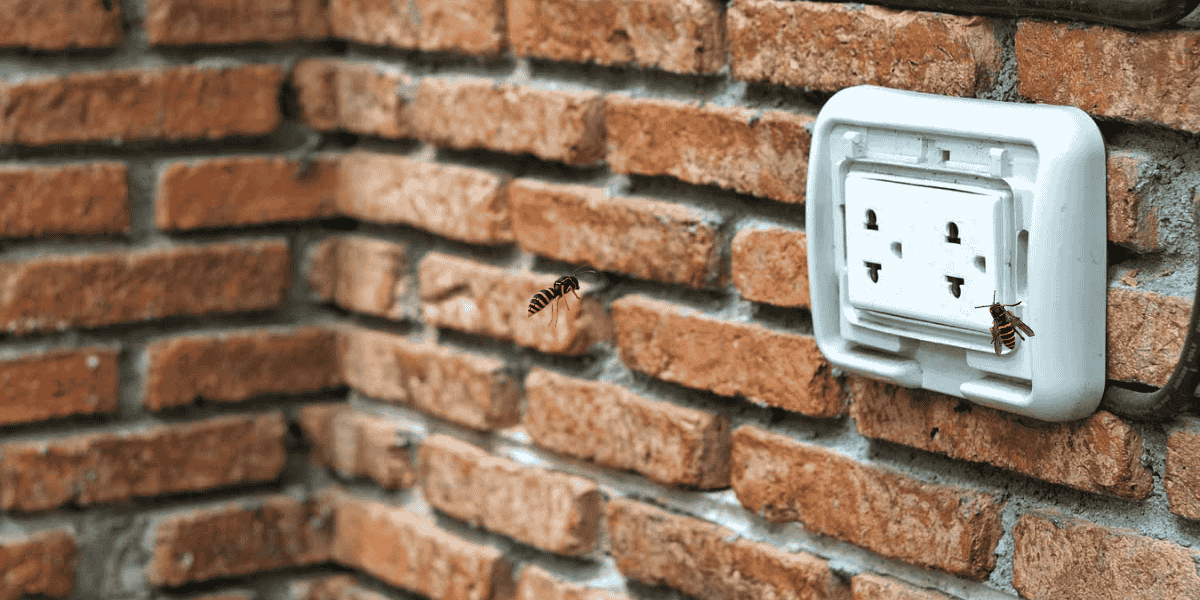What Happens When Wasps Nest in Your Electrical Outlet
August 21st, 2025
3 min read

You’re outside trimming bushes or watering the flowers when you notice a few wasps darting around the outlet on your porch. Then you realize, they’re not just flying near it. They’re going in and out of it.
It’s not just gross, it’s dangerous. Annnnd not just because you are afraid of the wasp....
At Integra Electrical, we’ve seen how insect nests inside outlets and meter boxes can lead to hidden electrical damage and fire hazards, especially in older homes. These aren’t just little annoying bugs; they could be posing a serious threat to your electrical system. Let's go over:
- Why wasps are drawn to electrical boxes
- What risks their nests can create
- What to do, and what not to do, if you find them
- How to prevent this from happening again
Why Wasps Nest in Electrical Outlets
To a wasp, your outdoor outlet box looks like the perfect home. It’s dry, hidden from wind and rain, and rarely disturbed. Most boxes, especially older ones, have tiny gaps or cracks around the cover plate or siding that make easy entry points for insects.
Once inside, wasps can build small papery nests that expand over time. If the outlet is warm (from sun exposure or electrical use), it only makes the space more attractive.
This is especially common with:
- Older siding-mounted outlets with loose covers
- Outlets near decks, sheds, or untrimmed bushes
- Weatherproof covers that have cracked or warped over time
What seems like just a bug problem can quickly become an electrical one if it’s left unchecked.
The Electrical Risk With Wasps
When wasps nest inside or around an outlet, it’s not just a nuisance; it’s a hidden hazard. Their presence can lead to a range of electrical issues, especially in older homes where outlet boxes may already be vulnerable.
Here’s what can happen:
- Damaged or blocked wiring: Nest material can crowd or press against wires, causing poor connections or wear over time
- Short circuits or fire risk: Moisture, debris, or chewed insulation can lead to arcing or overheating.
- Tripped breakers or dead outlets: You might lose power in part of your home and not realize why until the damage is visible.
- Injury risk: Trying to use an outlet while wasps are active could result in painful stings, or worse, a shock if the outlet is already compromised.
Even if the outlet still works, the hidden damage can build up behind the scenes. And unfortunately, many people don’t know there’s a problem until something smells like burning, or stops working entirely.
What Not to do When Wasps are in Your Electrical Outlet (A Real Story)
A friend of ours found a wasp nest in their outdoor outlet. So naturally, they did what no licensed electrician would ever recommend: grabbed a can of bug spray and gave it a spa day.
We’re talking full coverage. No wasp was left unsoaked.
Shockingly (literally), dousing an electrical outlet with flammable chemicals didn’t solve the problem. Instead, it shorted the wiring, scorched the box, and left her with a repair bill big enough to make the wasps look like the least of her problems.
It’s like trying to fix a gas leak with a tiki torch.
We all make silly mistakes sometimes, and honestly, their response was reasonable; it just wasn’t safe. If your plan to evict a wasp involves household chemicals and high voltage, maybe, just maybe, it’s time to call an exterminator or an electrician.
What To Do When Wasps are in Your Electrical Outlet
If you find wasps nesting in or around an electrical outlet, take a breath, then take the right steps. Here’s what we recommend:
- Stop using the outlet. Don’t plug anything in or flip switches nearby
- Shut off power to the outlet if you can safely reach the breaker. This reduces the risk of arcing or shock.
- Call pest control to handle the wasps. Let the pros deal with the bugs, preferably before they get aggressive.
- Have an electrician inspect the outlet afterward. Even if it looks fine, nests and insect activity can cause hidden damage behind the cover.
The sooner you act, the more likely you’ll avoid major repairs or unexpected sparks.
Keep the Wasps Out and the Power Safe
The best way to deal with wasps in an outlet is to stop them from moving in at all. That means sealing up vulnerable boxes, replacing old or cracked covers, and keeping an eye on any outdoor outlets, especially in older homes.
If you’ve seen insect activity around your electrical system, or if it’s been a while since anyone’s looked behind those covers, we can help. Our team at Integra Electrical can inspect your outdoor outlets, recommend sealed weatherproof upgrades, and make sure everything is safe, clean, and code-compliant.
It’s a quick visit now, or a surprise repair bill later. Let’s take care of it before the wasps throw a housewarming party.
The FAQs
Can wasps really damage an outlet?
Yes. Their nests can crowd wiring, trap moisture, or lead to short circuits, especially in older boxes with exposed connections.
Is it safe to spray bug killer in an outlet?
Nope. Most sprays are flammable and corrosive. You could damage the wiring or cause a fire. Bad combo.
How do I keep wasps out of my outlets?
Install sealed, weatherproof covers, keep vegetation trimmed, and have older boxes inspected regularly.
Jaime Carpenter is the founder and Vice President of Integra Electrical, a mom of five, and a homeowner who understands the importance of keeping your family safe—especially in older homes. With decades of leadership and life experience, she brings both heart and know-how to every home Integra serves.

